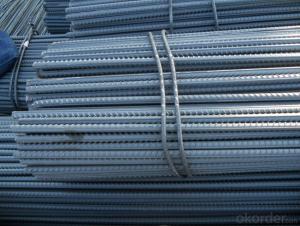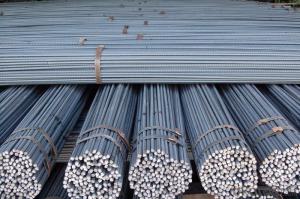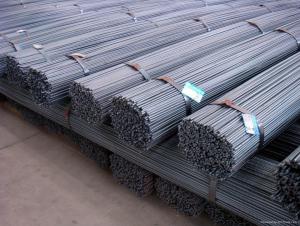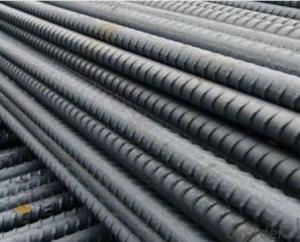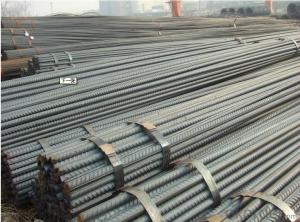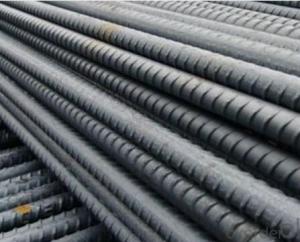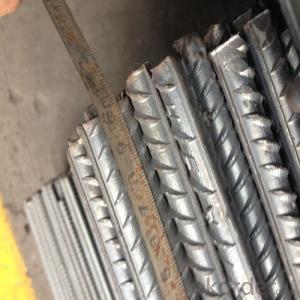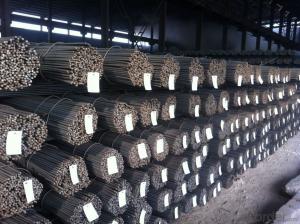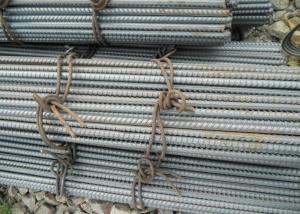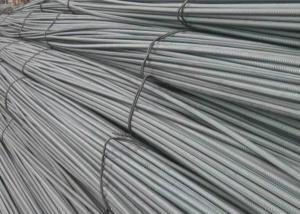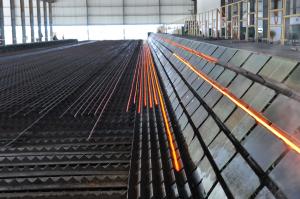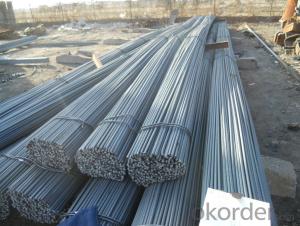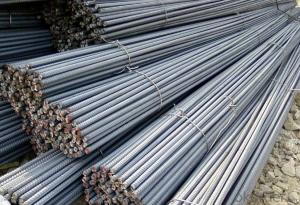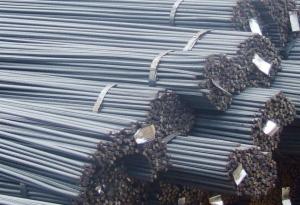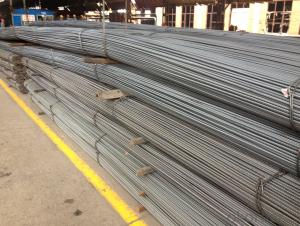Hot Rolled Deformed Bars with HRB 400-500
- Loading Port:
- Tianjin
- Payment Terms:
- TT OR LC
- Min Order Qty:
- 25 m.t.
- Supply Capability:
- 10000 m.t./month
OKorder Service Pledge
OKorder Financial Service
You Might Also Like
Product Description:
OKorder is offering high quality Hot Rolled Rebars at great prices with worldwide shipping. Our supplier is a world-class manufacturer of steel, with our products utilized the world over. OKorder annually supplies products to European, North American and Asian markets. We provide quotations within 24 hours of receiving an inquiry and guarantee competitive prices.
Product Applications:
Deformed bar is widely used in buildings, bridges, roads and other engineering construction. Big to highways, railways, bridges, culverts, tunnels, public facilities such as flood control, dam, small to housing construction, beam, column, wall and the foundation of the plate, deformed bar is an integral structure material. With the development of world economy and the vigorous development of infrastructure construction, real estate, the demand for deformed bar will be larger and larger..
Label: to be specified by customer, generally, each bundle has 1-2 labels
Product Advantages:
OKorder's Hot Rolled Rebars are durable, strong, and resist corrosion.
Main Product Features:
· Premium quality
· Prompt delivery & seaworthy packing (30 days after receiving deposit)
· Corrosion resistance
· Can be recycled and reused
· Mill test certification
· Professional Service
· Competitive pricing
Product Specifications:
Manufacture: Hot rolled
Grade: HRB400 – HRB500
Certificates: ISO, SGS, BV, CIQ
Length: 6m – 12m, as per customer request
Packaging: Export packing, nude packing, bundled
Grade | Technical data of the original chemical composition (%) | ||||||
C | Mn | Si | S | P | V | ||
HRB400 | ≤0.25 | ≤1.60 | ≤0.80 | ≤0.045 | ≤0.045 | 0.04-0.12 | |
Physical capability | |||||||
Yield Strength (N/cm²) | Tensile Strength (N/cm²) | Elongation (%) | |||||
≥400 | ≥570 | ≥14 | |||||
Theoretical weight and section area of each diameter as below for your information:
Diameter(mm) | Section area (mm²) | Mass(kg/m) | Weight of 12m bar(kg) |
6 | 28.27 | 0.222 | 2.664 |
8 | 50.27 | 0.395 | 4.74 |
10 | 78.54 | 0.617 | 7.404 |
12 | 113.1 | 0.888 | 10.656 |
14 | 153.9 | 1.21 | 14.52 |
16 | 201.1 | 1.58 | 18.96 |
18 | 254.5 | 2.00 | 24 |
20 | 314.2 | 2.47 | 29.64 |
22 | 380.1 | 2.98 | 35.76 |
25 | 490.9 | 3.85 | 46.2 |
28 | 615.8 | 4.83 | 57.96 |
32 | 804.2 | 6.31 | 75.72 |
36 | 1018 | 7.99 | 98.88 |
40 | 1257 | 9.87 | 118.44 |
50 | 1964 | 15.42 | 185.04 |
FAQ:
Q1: Why buy Materials & Equipment from OKorder.com?
A1: All products offered byOKorder.com are carefully selected from China's most reliable manufacturing enterprises. Through its ISO certifications, OKorder.com adheres to the highest standards and a commitment to supply chain safety and customer satisfaction.
Q2: How do we guarantee the quality of our products?
A2: We have established an advanced quality management system which conducts strict quality tests at every step, from raw materials to the final product. At the same time, we provide extensive follow-up service assurances as required.
Q3: What is the normal tolerance of Hot Rolled Mild Steel Angle Beams for Structures and for Buildings?
A3: Normally 3%-5%, but we can also produce the goods according to the customers' requests.
Images:
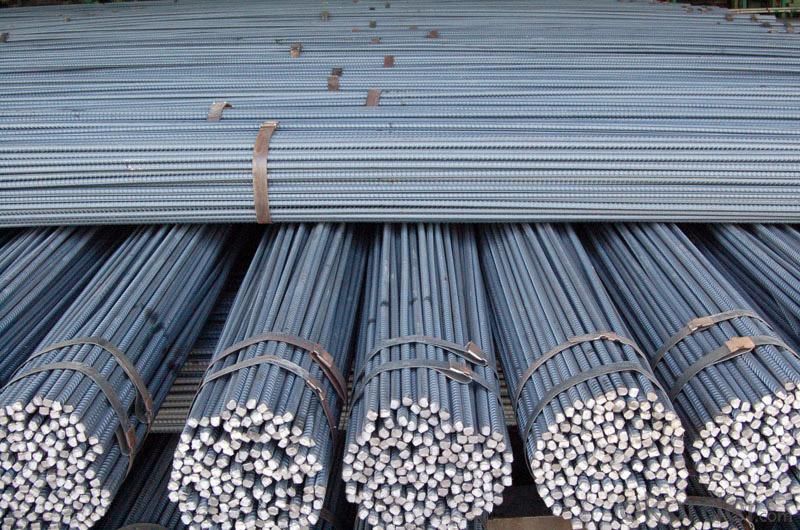
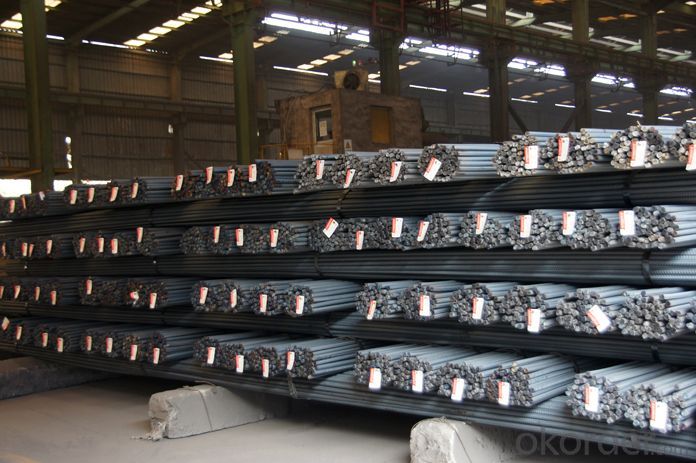
- Q:How are steel rebars used in tunnel construction?
- Steel rebars are used in tunnel construction to reinforce the concrete structure, providing strength and durability to the tunnel walls and roof. The rebars are placed in strategic locations within the concrete to prevent cracking and structural failure due to the high pressure and forces exerted on the tunnel.
- Q:What is the typical cost of steel rebars per ton?
- The typical cost of steel rebars per ton can vary depending on various factors such as the type and grade of rebar, market conditions, and location. However, as of 2021, the average price range for steel rebars is approximately $600 to $900 per ton.
- Q:Can steel rebars be bent without compromising their strength?
- Steel rebars possess the ability to be bent while still maintaining their strength. Their high tensile strength enables them to endure the forces of bending and stretching without experiencing any breakage or loss of structural integrity. The process of bending involves the application of a regulated amount of force to the rebar, causing the material to deform and acquire a new shape. However, it is essential to adhere to the recommended limits and guidelines provided by the manufacturer or industry standards when carrying out the bending procedure. Exceeding the specified limits may result in the development of microcracks or other defects that can compromise the strength of the rebar. Therefore, it is of utmost importance to employ proper bending techniques and utilize suitable equipment to ensure that the steel rebars retain their strength even after being bent.
- Q:What are the main uses of steel rebars?
- Steel rebars, otherwise known as reinforcing bars, serve as a crucial component in construction and civil engineering endeavors, granting robustness and steadiness to concrete structures. The primary applications of steel rebars encompass the following: 1. Reinforcement of Concrete: Steel rebars are strategically integrated within concrete structures to heighten their tensile strength. While concrete exhibits commendable resistance against compressive forces, it remains vulnerable in terms of tension. By incorporating rebars, the resulting composite material (reinforced concrete) is endowed with the ability to withstand both compressive and tensile forces, rendering it suitable for various applications such as building columns, beams, slabs, and foundations. 2. Enhancement of Structural Stability: Steel rebars play a pivotal role in elevating the structural stability of edifices and infrastructures. They facilitate the uniform distribution of loads across the structure, preventing the occurrence of cracks, sagging, or collapse. Through the reinforcement of concrete elements with rebars, structures become capable of enduring substantial loads, seismic activity, and other external forces. 3. Bridges and Highways: Steel rebars find extensive employment in the construction of bridges and highways. As bridges are routinely subjected to substantial loads and harsh environmental conditions, robust and durable reinforcement is imperative. Steel rebars ensure the longevity and structural integrity of these critical infrastructure projects. 4. Retaining Walls and Tunnels: Retaining walls serve the purpose of holding back soil or other substances, thereby preventing erosion. Steel rebars are commonly employed to reinforce these structures, enabling them to withstand the lateral pressures exerted by the retained material. Similarly, in tunnel construction, rebars bestow strength upon the concrete lining, ensuring stability and averting collapse. 5. Foundations: Steel rebars form an indispensable constituent in the construction of building foundations. They contribute to the even distribution of the structure's weight onto the ground, thereby averting the occurrence of settlement or sinking. Furthermore, rebars anchor the foundation to the ground, endowing it with stability against soil movement or seismic forces. 6. Pre-stressed and Post-tensioned Concrete: In the realm of pre-stressed and post-tensioned concrete construction, steel rebars are employed to introduce compressive forces into the concrete members. This technique elevates the structural performance by diminishing tensile stress, augmenting load-bearing capacity, and minimizing cracking. 7. Masonry Reinforcement: Steel rebars are also utilized to reinforce masonry structures such as walls, columns, and arches. By embedding rebars within mortar joints or cores, the overall strength and stability of the masonry system are enhanced, enabling it to withstand lateral loads and seismic forces. To summarize, steel rebars are indispensable in contemporary construction endeavors, furnishing concrete structures with strength, stability, and durability. By virtue of their capacity to resist tensile forces, they ensure the well-being and longevity of buildings, bridges, highways, tunnels, and other crucial infrastructure projects.
- Q:How long do steel rebars typically last before corroding?
- Steel rebars typically last for several decades before they start to corrode, depending on various factors such as the quality of the steel, environmental conditions, and the presence of protective coatings.
- Q:Can steel rebars be used in seawater desalination plants?
- Yes, steel rebars can be used in seawater desalination plants, but it is important to consider the corrosion potential of steel in a saline environment. Proper corrosion protection measures, such as using corrosion-resistant coatings or stainless steel rebars, should be implemented to ensure the longevity and structural integrity of the plant.
- Q:How do steel rebars impact the overall construction cost estimation process?
- Steel rebars can have a significant impact on the overall construction cost estimation process. They are a crucial component in reinforced concrete structures, providing strength and durability. The quantity and quality of steel rebars required for a project can influence the material cost, labor cost, and construction timeline. Accurate estimation of steel rebars is essential to ensure the project's structural integrity while avoiding cost overruns or delays.
- Q:What is the lifespan of steel rebars in different environments?
- The lifespan of steel rebars can vary depending on the environment in which they are employed. Typically, steel rebars are highly durable and can last for a considerable period. Nevertheless, the longevity of these materials can be affected by different environmental conditions. In a dry and non-corrosive setting, such as indoors or in a well-maintained building, steel rebars can endure for several decades or even longer. The absence of moisture and corrosive substances aids in maintaining the steel's integrity, minimizing the risk of deterioration. In a marine or coastal environment, where continual exposure to saltwater and high humidity occurs, the lifespan of steel rebars may be reduced. The corrosive properties of saltwater can expedite the corrosion process, potentially shortening the rebars' lifespan. In such scenarios, special coatings or treatments can be applied to the steel rebars to enhance their resistance to corrosion and prolong their lifespan. Similarly, steel rebars employed in areas with elevated levels of air pollution or industrial emissions may also experience accelerated corrosion. Airborne pollutants, such as sulfur dioxide or sulfuric acid, can interact with the steel and result in rust formation. Regular maintenance and cleaning of the rebars can help mitigate the impact of these corrosive substances and extend their lifespan. It is crucial to note that the quality of the steel rebars and construction practices also significantly influence their lifespan. The use of high-quality rebars that meet industry standards and adherence to proper installation techniques can greatly enhance their durability and longevity. In conclusion, while steel rebars generally have a long lifespan, the specific environment in which they are utilized will determine how effectively they serve their purpose. By considering environmental factors and implementing appropriate corrosion prevention measures, the lifespan of steel rebars can be maximized, ensuring the safety and durability of the structures in which they are incorporated.
- Q:Can steel rebars be galvanized for additional protection?
- Yes, steel rebars can be galvanized for additional protection. Galvanizing is a process where a layer of zinc is applied to the surface of the steel rebar. This layer acts as a protective barrier, preventing corrosion and extending the lifespan of the rebar. Galvanized steel rebars are commonly used in construction projects where exposure to moisture, chemicals, or other corrosive elements is expected. The galvanizing process involves dipping the steel rebars into a bath of molten zinc or applying a zinc-rich coating through a hot-dip galvanizing or electroplating process. This results in a durable and corrosion-resistant coating that provides additional protection to the steel rebar, increasing its longevity and reducing maintenance requirements. Overall, galvanizing steel rebars is an effective method of enhancing their protection against corrosion and ensuring their long-term durability in various applications.
- Q:How do steel rebars improve the ductility of a structure?
- Steel rebars improve the ductility of a structure by providing reinforcement and enhancing its ability to withstand tensile forces. The presence of rebars within concrete or other structural materials allows them to better absorb and distribute stress, preventing brittle failure and promoting flexural strength.
1. Manufacturer Overview |
|
|---|---|
| Location | |
| Year Established | |
| Annual Output Value | |
| Main Markets | |
| Company Certifications | |
2. Manufacturer Certificates |
|
|---|---|
| a) Certification Name | |
| Range | |
| Reference | |
| Validity Period | |
3. Manufacturer Capability |
|
|---|---|
| a)Trade Capacity | |
| Nearest Port | |
| Export Percentage | |
| No.of Employees in Trade Department | |
| Language Spoken: | |
| b)Factory Information | |
| Factory Size: | |
| No. of Production Lines | |
| Contract Manufacturing | |
| Product Price Range | |
Send your message to us
Hot Rolled Deformed Bars with HRB 400-500
- Loading Port:
- Tianjin
- Payment Terms:
- TT OR LC
- Min Order Qty:
- 25 m.t.
- Supply Capability:
- 10000 m.t./month
OKorder Service Pledge
OKorder Financial Service
Similar products
New products
Hot products
Related keywords
